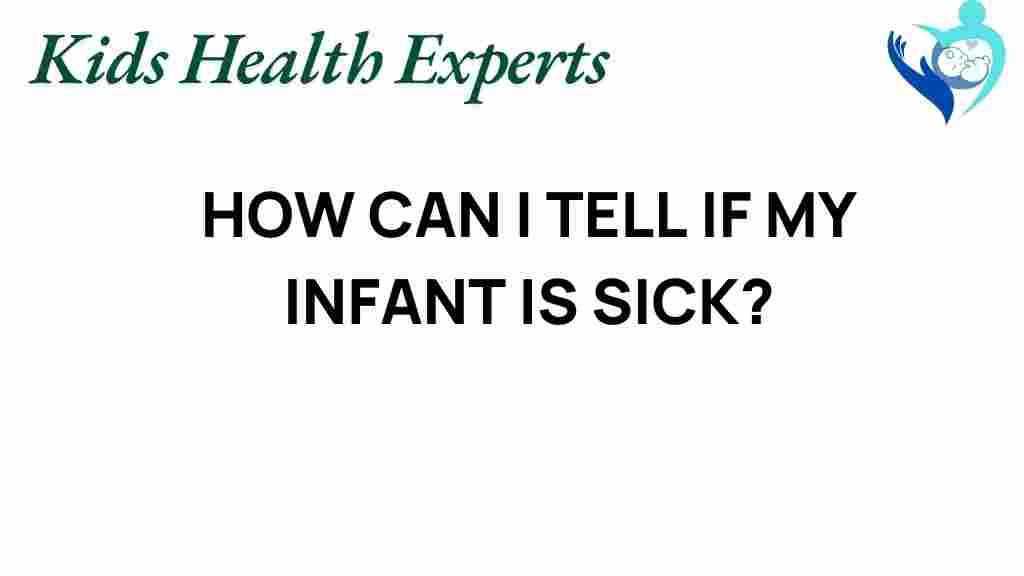Unveiling the Signs: How Can You Tell If Your Infant Is Sick?
As new parents, ensuring your infant’s health can be both an exciting and daunting experience. Understanding the signs of illness in your little one is crucial for timely intervention and effective newborn care. In this comprehensive guide, we will explore infant health, common signs of illness, and how to monitor your child’s well-being. By recognizing early symptoms, you can enhance your child’s wellness and ensure they receive the appropriate care when needed.
Understanding Infant Health
Infant health encompasses a range of factors that contribute to the overall well-being of your newborn. From physical health to emotional stability, monitoring your infant’s condition is paramount. Here are some essential aspects of infant health:
- Nutrition: Proper feeding is essential for growth and development.
- Sleep: Infants require adequate sleep for their physical and mental development.
- Regular Check-ups: Pediatric visits are crucial for monitoring growth and vaccination schedules.
- Hygiene: Maintaining cleanliness helps prevent infections.
Recognizing the Signs of Illness
Knowing how to identify when your infant may be unwell is a vital aspect of newborn care. Here are some common signs of illness to watch for:
- Fever: A rectal temperature above 100.4°F (38°C) may indicate a fever in infants.
- Change in Appetite: A significant decrease in feeding can signal illness.
- Persistent Crying: If your baby cries more than usual and is inconsolable, it may be a sign of discomfort.
- Changes in Sleep Patterns: Excessive sleepiness or difficulty waking can indicate health issues.
- Vomiting or Diarrhea: Frequent vomiting or diarrhea may lead to dehydration and requires attention.
- Skin Changes: Rashes, unusual pallor, or jaundice can indicate health problems.
- Respiratory Issues: Labored breathing, wheezing, or persistent cough should be evaluated.
Early Symptoms to Monitor
When it comes to infant health, early detection of symptoms is critical. Here are some early symptoms to monitor closely:
- Temperature Fluctuations: Rapid changes in temperature may indicate illness.
- Behavior Changes: A normally active baby who becomes lethargic may need to be assessed.
- Feeding Difficulties: If your baby is refusing to eat or having trouble feeding, it may be a sign of illness.
- Digestive Issues: Any unusual bowel movements or signs of discomfort can be a concern.
Parental Guidance and Pediatric Advice
As parents, you play a crucial role in monitoring your infant’s health. Here are some tips for effective monitoring:
- Keep a Health Journal: Document your infant’s temperature, feeding times, and any unusual behaviors.
- Use a Thermometer: Regularly check your baby’s temperature, especially if they seem unwell.
- Consult Your Pediatrician: Don’t hesitate to reach out to your pediatrician if you notice concerning signs.
- Trust Your Instincts: If something feels off, it’s always best to seek professional advice.
Health Monitoring Tips
Effective health monitoring can help catch potential issues early on. Here are some strategies:
- Regular Pediatric Visits: Schedule routine check-ups for vaccinations and growth monitoring.
- Observe Behavioral Changes: Pay attention to any shifts in your infant’s behavior or mood.
- Monitor Feeding Patterns: Keep track of how much and how often your baby eats.
- Check for Dehydration: Look for signs such as dry mouth, fewer wet diapers, or lethargy.
Troubleshooting Common Issues
As a parent, you may encounter common health issues with your infant. Here’s how to troubleshoot:
- Fever: If your infant has a fever, give them a lukewarm bath and keep them hydrated. Consult your pediatrician if the fever persists.
- Cough: For coughing, ensure your baby stays hydrated, and use a cool-mist humidifier to ease breathing difficulties.
- Digestive Problems: If your baby has diarrhea, ensure they are drinking enough fluids to prevent dehydration. Seek medical advice if symptoms last more than a day.
- Skin Rashes: Keep the area clean and dry. If the rash worsens or doesn’t improve, consult a pediatrician.
When to Seek Medical Attention
While many illnesses can be managed at home, some situations warrant immediate medical attention:
- High Fever: Any fever above 100.4°F (38°C) in infants under three months should be evaluated by a doctor.
- Difficulty Breathing: If your baby is struggling to breathe, seek help immediately.
- Severe Vomiting: Vomiting that lasts more than a few hours or is accompanied by other symptoms may require medical evaluation.
- Signs of Dehydration: Lack of wet diapers, dry mouth, or extreme lethargy indicate dehydration and require urgent care.
Conclusion
Being attentive to your infant’s health is an essential part of newborn care. Recognizing the signs of illness early can lead to better outcomes for your child’s well-being. Monitoring infant health through regular check-ups, behavioral observations, and maintaining open communication with your pediatrician is crucial. Always trust your instincts; if something feels wrong, it’s better to seek professional advice.
For more guidance on infant health and wellness, consider visiting healthcare resources or consult your pediatrician for personalized pediatric advice. Remember, early detection is key to keeping your baby healthy and thriving!
This article is in the category Care and created by KidsHealthExperts Team

1 thought on “Unveiling the Signs: How Can You Tell If Your Infant Is Sick?”